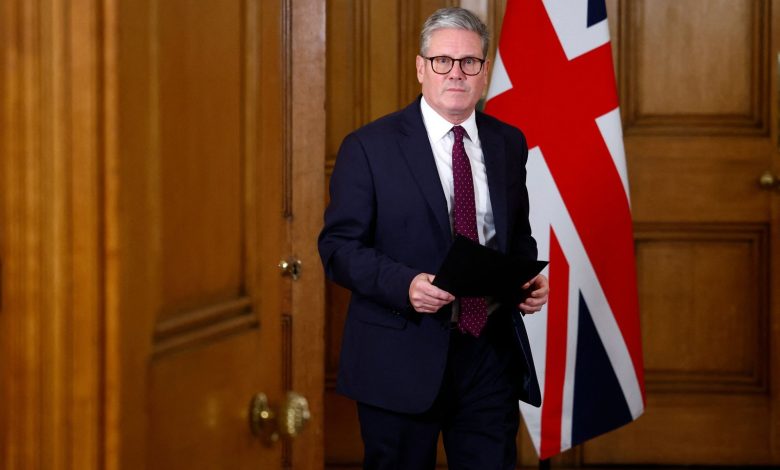New UK PM Starmer to face tough job in courting skeptical investors

British Prime Minister Keir Starmer, who just recently took up the top post, would be facing a tough sales job later this month in his first high-profile meeting with international investors whose cash he needs to accelerate economic growth and halt a sense of national decline.
Starmer will host executives from global banks, power firms and other multinationals on Oct. 14, hoping that political volatility in France, Germany and the United States will enhance Britain’s attractiveness.
But big questions hang over how he will tackle the problems that hampered previous governments.
Years of Brexit-linked political chaos may have ended with his Labour Party’s big election win, but the near-collapse of utility Thames Water has unsettled investors.
Britain’s privatized water industry is under fire for polluting rivers with sewage amid accusations that profit has been prioritized over the environment. Current investors in Thames Water blame regulators for limiting bill rises they say are needed to fund investment.
“We’re talking to international investors, and they’re very nervous about the U.K.,” Luke Hickmore, investment director at investment firm abdrn – a Thames Water creditor – said.
“That’s largely around the uncertainty on regulation.”
Britain needs tens of billions of pounds annually to upgrade infrastructure to meet Starmer’s promise to double economic growth and raise the tax revenues needed to improve public services. But it cannot match the big subsidies on offer in the United States and eurozone for the net-zero transition.
Four days after July’s election, Finance Minister Rachel Reeves outlined plans to unblock planning and financing constraints on infrastructure and home-building.
But details remain scant and the government has yet to appoint an investment minister.
“There is definitely a sense that they have identified some of the problems, but it’s very early days and there are a lot of unanswered questions,” Raoul Ruparel, director of the Boston Consulting Group’s Centre for Growth, said.
Low rates of return on private investment – and often over-complicated contractual terms – were compounded by elevated labor and energy costs and skills shortages, he said.
“The rest of Europe is similar, but the U.K. is a different story because of its long-running under-investment problem.”
Britain ranked 28th among 31 countries in the Organisation for Economic Co-operation and Development (OECD) for business investment as a percentage of national income in 2022, according the Institute for Public Policy Research think tank.
U.K. government officials say they are making progress, pointing to recent announcements like a 10 billion pound ($13.3 billion) investment by private equity firm Blackstone in an AI data center and a planned 8 billion pound investment by Amazon.
Investor worries
Britain has lost its ranking as Europe’s top foreign direct investment destination – ranked by the total number of projects – to France, although it was the leader in 2023 for new projects, accountancy firm EY says.
A survey of investors published in July by consultants Alvarez & Marsal showed Britain was Europe’s only big economy ranked negatively on the outlook for infrastructure attractiveness and opportunities, mostly due to regulation.
“The government doesn’t understand that clear, distinctive and predictable regulation is still an opportunity the U.K. hasn’t seized,” said a senior London-based consultant, who asked not to be named.
Hickmore at abrdn said investors faced a “perfect storm” of higher interest rates, government change and regulation, adding: “We’ve seen the regulators get tough at just the wrong point in the cycle.”
Starmer’s government plans new laws to toughen oversight of the water companies, including potential curbs on executives’ pay – a response to public anger at Britain’s dirty rivers.
Investors must also wait to see the new government’s tax policy: Reeves will announce her first budget on Oct. 30, having hinted at higher taxes for the wealthy.
A business survey last month showed expansion plans were being put on ice pending clarity on the budget.
Further ahead, a spending review next Spring will reveal the government’s own investment plans for power, transport and other infrastructure over the coming years, providing a foundation for the private sector.
Ruparel said investors wanted a shift away from the focus of recent British governments on meeting budget rules at the expense of longer-term strategy.
“Businesses appreciate the balance-sheet challenges but they are looking for strategic guidance and clarity over where the government is going with its own investment plans,” he said.
Reeves has hinted at such a shift in her budget plan.
Some investors worry that the government’s gloomy message about the economy it inherited from the Conservatives is a precursor for investment-sapping tax increases, including possibly on capital gains.
“Those types of measures might be counterproductive to what they are trying to achieve,” Peter Arnold, EY’s chief U.K. economist.


